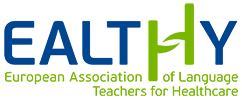Welcome to part II of the interview with Virginia Allum, head of SLC's Medical English courses and lead Medical English consultant. In addition to being a lecturer in English for Medical Purposes, she is a Medical English teacher trainer, and a widely published writer.
In this part Virginia will discuss what the main challenges are for doctors, nurses and carers who are taking these courses.
5. How long have you been writing online?
I started developing online courses five or so years ago, as a bit of an experiment. I learned how to make short cartoons to enable learners to visualize dialogues a little better. I felt that audio clips were a good start, but were a little limited. Presenting material online also allowed for the use of audio and interactive activities, which I think help learners to remain motivated.
6. How is writing an online course different to writing a text book?
One of the main advantages of an online course over a textbook for me as an author is the ease of updating. Any author will tell you that however carefully a book is proofread, errors manage to creep in. Added to this, the medical field changes so rapidly that information can become outdated or irrelevant very quickly. Take the case of diabetes management and the use of insulin pens as an example. Updates to an online course can be made in an afternoon, whereas changes to a textbook are more problematic.
The writing itself is similar – present new information, practise it and then produce something new with the information. Of course, some learners like the feel of a book and like to write answers into their own book. Despite this, pages of online courses can be printed for the same experience.
7. Let’s talk about the Medical English courses you wrote with SLC. Where do you think the main challenges are for doctors, nurses and carers?
If you talk to international healthcare workers, they will usually say that there are two main areas of difficulty for them. One area is language – being confident using appropriate English in a medical environment. There is always the fear that using the wrong word or term could cause serious problems for patients. This is why the SLC online courses are presented in a way that encourages as much practice as possible – dialogues are presented, watched and practised, as if the learner is the doctor, nurse or carer in the dialogue. Reading and writing of medical English texts is also a large part of the courses, so that familiarity is developed with medical English terms.
The second area is what is best described as hospital culture. The rules and protocols of working in a UK hospital or care home. Of course, UK hospital culture is similar to other English-speaking countries such as Australia or New Zealand. What I am talking about here are issues like patient confidentiality, patient’s rights and responsibilities and dignity and privacy. These issues are touched on and introduced into dialogues where appropriate.
In PART III Virginia will discuss how she created the syllabus for SLC's Online Medical English courses, what she does in her spare time, and her ideas for future courses.






